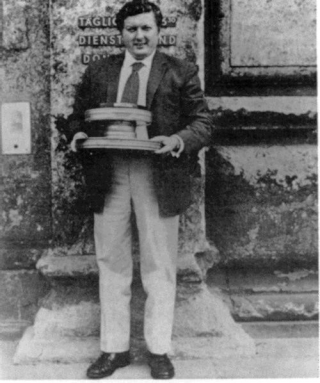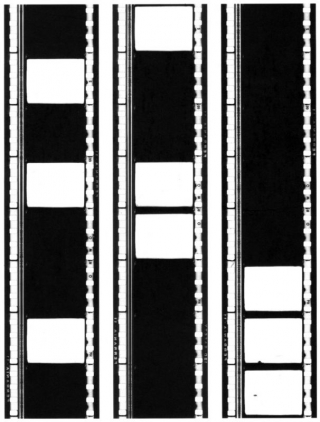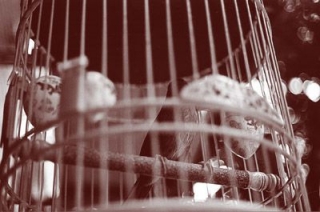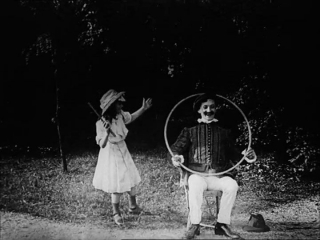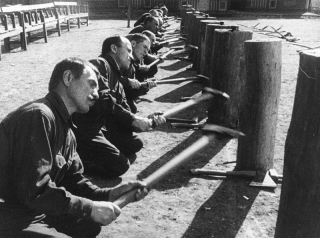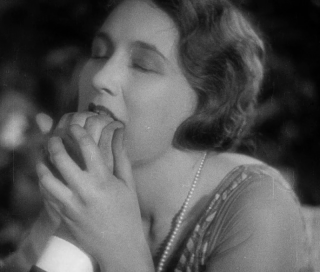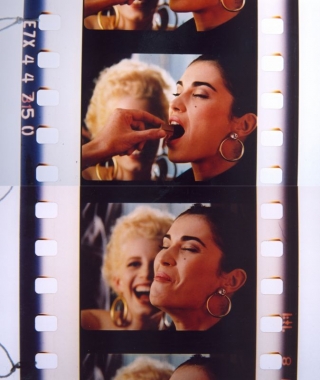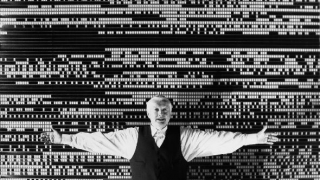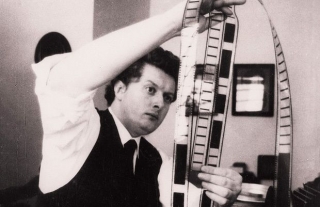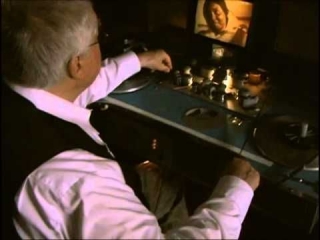Date: 8 November 2001 | Season: London Film Festival 2001 | Tags: London Film Festival, Peter Kubelka, What is Film?
PETER KUBELKA: WHAT IS FILM?
8-14 November 2001
London National Film Theatre
“Peter Kubelka is the perfectionist of the film medium” (Stan Brakhage)
A series of four public lectures in which films from Lumière to the present day will be used to celebrate cinema as a cultural phenomenon, whilst defining film as an independent medium and distinguishing it from those arts that existed before it, and the new media (such as television and the internet) that have become dominant in recent years.
Peter Kubelka will demonstrate the unique and indispensable qualities of film through detailed analysis of those works that best represent the essence of the cinema. In this extraordinary series of events, he will expose the mechanics and grammar of film that are otherwise hidden from the public. After viewing the films, the audience will have an opportunity to look over his shoulder in a situation similar to that of seeing the filmmaker at the editing table. Using a projecting Steenbeck, Kubelka will analyse, letter by letter, the language that cinema speaks. He will argue that as each mode of communication induces its own world-view, the vital and autonomous experience of cinema cannot be transferred to other media without loss of content or the understanding of the artist’s original intentions. Film is a tool that is able to create new thoughts and Peter Kubelka will bring forth the hardcore of cinema: those ideas and concepts that cannot be touched by any other art form.
“Kubelka’s cinema is like a piece of crystal, or some other object of nature: it does not look like it was produced by man.” (P. Adams Sitney)
Peter Kubelka is one of the most distinguished figures in the history of 20th century independent filmmaking. His films, made between 1955 and 1977, are an innovative demonstration of cinematic possibilities and now reside in the collections of many world-renowned museums. Moreover, his practice is not only limited to filmmaking: as an artist or theoretician he has also worked in architecture, literature, music, painting and cooking. During his time as co-director of the Austrian Film Museum in Vienna, which he founded in 1964, he has passionately dedicated himself to other artistic practices. His formation of the ensemble Spatium Musicum led to an intensive study of essential music, and his teaching on the topic of food preparation as an art form at the Frankfurt School of Fine Arts led to an extension of his title as Professor of Film to that of Film and Cooking. His design for an ideal cinema auditorium, The Invisible Cinema, has been realised in New York and Vienna. Over the past 40 years he has lectured at museums, universities and institutions throughout the world, and has been awarded the Austrian State Prize for his life’s work.
(Mark Webber)
PETER KUBELKA: WHAT IS FILM?
1: THE FILMMAKERS VIEW: THE EVENT OF CINEMA
2: THE MATERIAL OF FILM: TOOL AND PERSONALITY
3: THE LANGUAGE OF FILM: METAPHORS BETWEEN SOUNDS AND IMAGES
4: THE REAL WORLD: A MYTH CREATED BY CINEMA
Date: 8 November 2001 | Season: London Film Festival 2001 | Tags: London Film Festival, Peter Kubelka, What is Film?
PETER KUBELKA: WHAT IS FILM? 1
Thursday 8 November 2001, at 6:35pm
London National Film Theatre NFT3
THE FILMMAKERS VIEW: THE EVENT OF CINEMA
“Every endeavour to be objective is personal. I begin my analysis of cinema with the analysis of my own work, which contained my position before I was able to put some of it into words.”
Featuring the following works:
Peter Kubelka, Arnulf Rainer, Austria, 1960, 6m
Peter Kubelka, Schwechater, Austria, 1958, 1m
Peter Kubelka, Adebar, Austria, 1957, 1m
Étienne-Jules Marey, La Chronophotographie, France, 1882–1902, photographic slides
The complete list of films in the repertory, and the themes covered, may be subject to spontaneous change during the course of the presentations.
Date: 8 November 2001 | Season: London Film Festival 2001 | Tags: London Film Festival, Peter Kubelka
IN KUBELKA’S SHADOW
Thursday 8 November 2001, at 9pm
London National Film Theatre NFT3
A selection of films by former students of the “Film und Kochen” course at the Staatliche Hochschule für Bildende Künste (Städelschule) in Frankfurt. The shadow of Professor Peter Kubelka looms large over these works by his young protégés, as the films are characterised by an acute attention to detail and by the respect paid to each individual frame. Absolute care is taken with composition while cutting together adjacent shots and in the juxtaposition between sound and image. Several of the films are extraordinary travelogues, covering Romania (Palatca, Frühling 1997), Italy (Mia Zia and Il Palio) and Taiwan (Hwa-Shan-District, Taipei), as alive as the spaces they portray. Turning their attention to the body, Zehetner investigates foot fetishism, and Sackl makes a time-lapse documentation of personal activities, an elementary performance. Metropolen des Leichtsinns uses found footage to consider the possibilities of human experience. Biesendorfer’s films are the most tactile; No Wonder is a directly emotional and explicit diary of life and love.
Bernhard Schreiner, Hwa-Shan-District, Taipei, Germany, 2001, 13 min
Nino Pezzella, Mia Zia, Germany, 1992/2000, 2 x 2 min
Gergard Geiger, Palatca, Frühling 1997, Germany, 2000. 23 min
Georg Wasner, Il Palio, ein Film über die gemeinsame Reise nach Italien, Germany, 1999, 2 x 1 min
Gunther Zehetner, Meine Verehrung, Germany, 2000, 9 min
Thomas Draschan & Ulrich Wiesner, Metropolen des Leichtsinns, Germany, 2000, 12 min
Albert Sackl, Gut Ein Tag Mit Verschiedenem, Germany, 2000, 12 min
Frank Biesendorfer, No Wonder, Germany, 1999, 12 min
Many thanks to Thomas Draschan and Peter Kubelka for their assistance with this programme.
Also screening: Saturday 10 November 2001, at 1:30pm, NFT3
Date: 10 November 2001 | Season: London Film Festival 2001 | Tags: London Film Festival, Peter Kubelka, What is Film?
PETER KUBELKA: WHAT IS FILM? 2
Saturday 10 November 2001, at 4:15pm
London National Film Theatre NFT3
THE MATERIAL OF FILM: TOOL AND PERSONALITY
“Film is a transparent sculpture. The material is servant and teacher. Form cannot be transferred and therefore content cannot be transferred. The event of Cinema is unique.”
Featuring selections from the following works:
Emile Cohl, Le Cerceau Magique, France, 1908, 6m
Len Lye, Free Radicals, USA, 1958, 4m
Stan Brakhage, Mothlight, USA, 1963, 3m
Owen Land (Formerly Known As George Landow), Film in which there Appear Sprocket Holes, Edge Lettering, Dirt Particles, etc., USA, 1965-66, 5m
Karin Hörler, Frisch, Germany, 1987, 2m
Bruce Conner, Valse Triste, USA, 1979, 6m
Frères Lumière, Voltiges, France, 1898, 1m
Frères Lumière, Indochine, Enfants Anamites, France, 1898, 1m
Frères Lumière, La Course en Sacs, France, 1898, 1m
Stan Brakhage, Window Water Baby Moving, USA, 1962, 12m
Paul Sharits, T:O:U:C:H:I:N:G, USA, 1968, 12m
The complete list of films in the repertory, and the themes covered, may be subject to spontaneous change during the course of the presentations.
Date: 12 November 2001 | Season: London Film Festival 2001 | Tags: London Film Festival, Peter Kubelka, What is Film?
PETER KUBELKA: WHAT IS FILM? 3
Monday 12 November 2001, at 6:30pm
London National Film Theatre NFT3
THE LANGUAGE OF FILM: METAPHORS BETWEEN SOUNDS AND IMAGES
“Film articulates in metaphors. Between frames, between frames and contemporaneous sounds, between sounds and other sounds brought together by the maker. I will try to make the atoms of film language audible and visible.”
Featuring selections from the following works:
Fernand Léger, Ballet Mecanique, France, 1923-24, excerpt
Robert Breer, Time Flies, USA, 1997, 5m
Dziga Vertov, Enthusiasm, Russia, 1930, excerpt
Paul Sharits, Word Movie, USA, 1966, 4m
Georges Méliès, Le Magicien, France, 1898, 1m
Peter Kubelka, Unsere Afrikareise, Austria, 1966, 12.5m
The complete list of films in the repertory, and the themes covered, may be subject to spontaneous change during the course of the presentations.
Date: 14 November 2001 | Season: London Film Festival 2001 | Tags: London Film Festival, Peter Kubelka, What is Film?
PETER KUBELKA: WHAT IS FILM? 4
Wednesday 14 November 2001, at 6:30pm
London National Film Theatre NFT3
THE REAL WORLD: A MYTH CREATED BY CINEMA
“Of the world we know only what art has taught us. In the last 100 years cinema has shaped a world, real for us, of which our ancestors could not have dreamed.”
Featuring selections from the following works:
Marie Menken, Go, Go, Go!, USA, 1962-64, 11m
Robert Breer, Eyewash, USA, 1959, 3m
Michael Snow, See You Later / Au Revoir, Canada, 1990, 16m
Fernand Léger, Ballet Mecanique, France, 1923-24, excerpt
Frères Lumière, Demolition D’un Mur, France, 1896, 1m
Georges Kuchar, Hold Me While I’m Naked, USA, 1966, 15m
Georges Kuchar, Wild Night in El Reno, USA, 1977, 6m
Luis Buñuel & Salvador Dalí, L’age D’or, Spain, 1930, excerpt
The complete list of films in the repertory, and the themes covered, may be subject to spontaneous change during the course of the presentations.
Date: 2 November 2011 | Season: Plenty | Tags: Peter Kubelka
PLENTY 12: DICHTUNG UND WAHRHEIT
Tuesday 2 November 2011, at 7pm
London E:vent Gallery
The screening series PLENTY proposes a new way of looking at artists’ films by showing only a single work, regardless of its duration. Each film is given the freedom to unfold on its own terms, and the viewer is given the time and space to consider it.
DICHTUNG UND WAHRHEIT (POETRY AND TRUTH)
Peter Kubelka, Austria, 2003, 16mm, colour, silent, 13 min
In cinema, as in anthropological study, the ready-made reveal ssome of the fundamental poetry and truth of our lives. Peter Kubelka unearthed sequences of discarded takes from advertising films and presents them, almost untouched, as documents that unwittingly offer valuable and humorous insights into the human condition.
“Peter Kubelka is the world’s greatest filmmaker – which is to say, simply: see his films! … by all means/above all else … et cetera.” (Stan Brakhage)
Peter Kubelka (born 1933) is an artist, anthropologist, cook and teacher. Active as a filmmaker over five decades, his total output amounts to some sixty-two minutes of screen time in which he explores the essential qualities of cinema.
PLENTY, a free monthly screening series selected by Mark Webber, forms part of the “Brief Habits” programme curated by Shama Khanna.
Date: 10 October 2012 | Season: London Film Festival 2012 | Tags: London Film Festival, Peter Kubelka
MONUMENT FILM INSTALLATION
Wednesday 10 – Sunday 21 October 2012
London BFI Southbank Atrium
Peter Kubelka, Monument Film, Austria, 2012, film installation
Kubelka first presented film as a three dimensional sculptural object in 1958. As an integral part of his new work Monument Film, the celluloid filmstrips of Arnulf Rainer (1960) and Antiphon (2012) will be exhibited on the walls of the Atrium at BFI Southbank, making manifest the relationship between space, time, and the physical material which runs through the projector.
Admission Free. Open from 12pm to 9pm daily.
Date: 11 October 2012 | Season: London Film Festival 2012 | Tags: London Film Festival, Peter Kubelka
PETER KUBELKA: THE ESSENCE OF CINEMA
Thursday 11 October 2012, at 6pm
London ICA Cinema 1
The seven films made by Peter Kubelka between 1955 and 2003 are an extraordinary demonstration of cinematic possibilities. In the ‘metric’ films Adebar, Schwechater and Arnulf Rainer, each individual element is precisely placed in relation to each other and the whole, resulting in a rhythmic viewing experience that articulates his assertion that ‘film is not movement’. The ‘metaphoric’ works Mosaik im Vertrauen, Unsere Afrikareise, Pause! and Dichtung und Wahrheit explore ways in which meaning can be constructed by the juxtaposition of images and sound. Astounding at first sight, our understanding of these films deepens with repeated viewings.
‘Kubelka’s cinema is like a piece of crystal, or some other object of nature: It doesn’t look like it was produced by man; one could easily conceive that it was picked up from among the organic treasures of nature.’ (Jonas Mekas)
Peter Kubelka, Mosaik im Vertrauen, 1955, 17 min
Peter Kubelka, Adebar, Austria, 1957, 2 min
Peter Kubelka, Schwechater, Austria, 1958, 1 min
Peter Kubelka, Arnulf Rainer, Austria, 1960, 6 min
Peter Kubelka, Unsere Afrikareise, Austria, 1966, 13 min
Peter Kubelka, Pause!, Austria, 1977, 12 min
Peter Kubelka, Dichtung und Wahrheit, Austria, 2003, 13 min
Peter Kubelka will present his new work Monument Film at BFI Southbank on Sunday 21 October at 2pm. The Monument Film installation is on display at BFI Southbank for the duration of the Festival. Martina Kudlácek’s documentary Fragments of Kubelka screens at the ICA on Saturday 13 October at 1pm.
PROGRAMME NOTES
PETER KUBELKA: THE ESSENCE OF CINEMA
Thursday 11 October 2012, at 6pm
London ICA Cinema 1
MOSAIK IM VERTRAUEN
Peter Kubelka, Austria, 1955, 35mm, b/w & colour, sound, 17 min
Kubelka’s motives for making the film lie in his belief that commercial films do not fully exploit cinematic possibilities. He declares that the place of the plot and its ostensibly disparate scenes is the screen, and the time shall be any time at which the film is shown. (Alfred Schmeller)
ADEBAR
Peter Kubelka, Austria, 1957, 35mm, b/w, sound, 2 min
Here, at last, is a filmmaker’s ear that creates in contrapuntal accord with his eye in the making. If the projection of Adebar is perfectly synced, the experience is an indescribably new one for any with eyes and ears to see/hear it. (Stan Brakhage)
SCHWECHATER
Peter Kubelka, Austria, 1958, 35mm, b/w & colour, sound, 1 min
Kubelka’s achievement is that he has taken Soviet montage one step further. While Eisenstein used shots as the basic units and edited them together in a pattern to make meanings, Kubelka has gone back to the individual still frame as the essence of cinema. (Fred Camper)
ARNULF RAINER
Peter Kubelka, Austria, 1960, 35mm, b/w, sound, 6 min
Arnulf Rainer is an architecture built in time by cinema. It uses only the four essential elements of the medium: light, darkness, sound and silence. (Peter Kubelka)
UNSERE AFRIKAREISE
Peter Kubelka, Austria, 1966, 16mm, colour, sound, 13 min
Unsere Afrikareise is about the richest, most articulate, and most compressed film I have ever seen. Kubelka’s film is one of the cinema’s few masterpieces and a work of such great perfection that it forces one to re-evaluate everything that one knew about cinema. The incredible artistry of this man, his incredible patience, his methods of working, and the beauty of his accomplishment, makes the rest of us look like amateurs. (Jonas Mekas)
PAUSE!
Peter Kubelka, Austria, 1977, 16mm, colour, sound, 12 min
Arnulf Rainer’s face art, which constitutes the source of imagery of Pause!, is a chapter of modern art in itself. Kubelka had to consume and to transcend not only Arnulf Rainer but also to transcend the entire genre of contemporary art known as face art. Both Rainer and Art disintegrated and became molecules, frames of movement and expression, material at the disposal of the Muse of Cinema. Pause! is an ecstatic work. (Jonas Mekas)
DICHTUNG UND WAHRHEIT
Peter Kubelka, Austria, 2003, 35mm, colour, silent, 13 min
Dichtung und Wahrheit features 12 stories; 12 sequences, each composed of one shot that is repeated in three, or five, or a dozen variations. Each take captures a movement from a stasis to motion and back again. For Kubelka, the repetition of physical movement – as in dance, as in film, as in life – is the fundamental law of the universe, from which even civilization’s most complex systems derive. (Alexander Horwath)
Back to top
Date: 13 October 2012 | Season: London Film Festival 2012 | Tags: London Film Festival, Peter Kubelka
FRAGMENTS OF KUBELKA
Saturday 13 October 2012, at 1pm
London ICA Cinema 1
Martina Kudlácek, Fragments of Kubelka, Austria, 2012, 232 min
In this extended portrait, Peter Kubelka speaks at length about his life, work and interests, drawing on a vast range of knowledge and experience. Active as a filmmaker since the 1950s, Kubelka’s acclaimed cinematic works are only one aspect of his dynamic personality. In his legendary public lectures, he holds forth on a variety of disciplines including film, music, archaeology and cooking. He has also played an important institutional role in establishing the Austrian Film Museum, and as co-founder of Anthology Film Archives, for whom he designed an ideal viewing theatre known as the Invisible Cinema. Martina Kudlácek (known for previous documentaries on Maya Deren and Marie Menken) immersed herself in Kubelka’s world for several years, researching historical footage, recording lectures, and perhaps most importantly, filming him at home surrounded by his eclectic collection of anthropological objects. In these precious sequences, Fragments of Kubelka provides extraordinary insight in conveying his philosophy on life and art.
PROGRAMME NOTES
FRAGMENTS OF KUBELKA
Saturday 13 October 2012, at 1pm
London ICA Cinema 1
FRAGMENTS OF KUBELKA
Martina Kudlácek, Austria, 2012, HD video, colour, sound, 232 min
Fragments of Kubelka is an epic documentary subtly introduces the complex worldview of iconic filmmaker and theoretician Peter Kubelka (born 1934, Vienna). While Kubelka’s radical and pioneering body of films is a highly condensed work of about an hour, focusing on the essence of cinema, his legendary lectures often unfold over many hours. These lectures on ‘what is cinema’ and ‘cooking as an art form’ are frequently illuminated by presentation of archaeological artefacts from Kubelka’s eclectic collection. He considers his ongoing collecting to be an expanded film practice which explores the evolution of humanity. Martina Kudlácek has carefully woven an open-ended portrait which goes beyond the biographical to reveal fresh insights into the phenomenon of film.
The filmmaker Jonas Mekas has written: ‘Kubelka’s cinema is like a piece of crystal, or some other object of nature: It doesn´t look like it was produced by man; one could easily conceive that it was picked up from among the organic treasures of nature.’
Back to top
